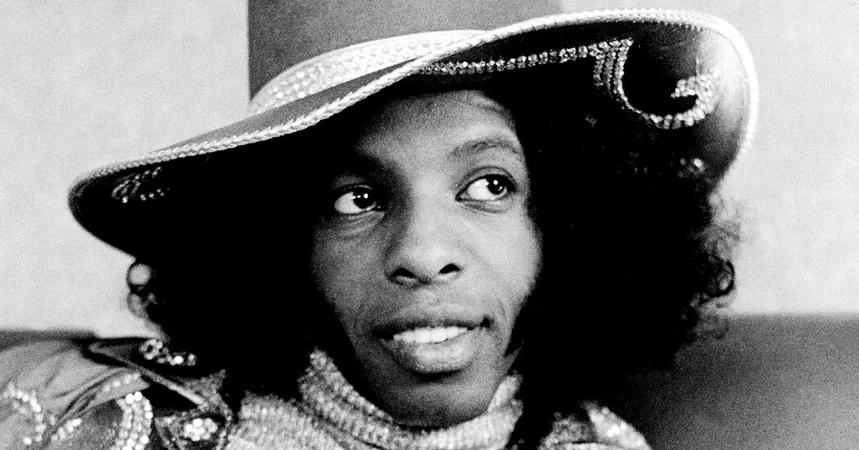
Sly Stone: The Iconic Architect of Funk Who Left Us at 82
2025-06-10
Author: Jia
Sly Stone, the vibrant and groundbreaking singer-songwriter known for his revolutionary sound with Sly and the Family Stone, has passed away at 82 due to complications from COPD and other health issues. His death was confirmed on Monday in Los Angeles.
As the architect of a diverse and eclectic band, Sly Stone reshaped the landscape of music in the late 1960s and early '70s, blending R&B, soul, and gospel with psychedelic rock and funk. He not only created dance anthems but also crafted songs that served as powerful political statements.
A Legacy That Resonates
Stone's influence is woven into the fabric of music history. His innovative songwriting and arrangements inspired legendary artists such as George Clinton, Prince, Michael Jackson, and Outkast. Music critic Joel Selvin succinctly stated, "There was Black music before Sly Stone, and Black music after Sly Stone.”
His legacy experienced a resurgence thanks to recent initiatives by musicians like Questlove, who directed the acclaimed 2021 documentary "Summer of Soul," featuring a stunning performance by Sly and the Family Stone at the Harlem Cultural Festival in 1969. Stone's autobiography, "Thank You (Falettinme Be Mice Elf Agin)," released in 2023, further celebrated his artistic journey.
Musical Trailblazer
From 1968 to 1971, Stone and his band produced a remarkable sequence of albums, including the iconic "Stand!" and the politically charged "There’s a Riot Goin’ On." These works not only celebrated the spirit of the times but also critically examined the social challenges of an era marked by change.
The Enigmatic Star
Despite a retreat from the spotlight during the late '70s and '80s, Sly remained an unpredictable yet magnetic figure. He famously became one of the first mainstream artists to utilize a drum machine, influencing the burgeoning hip-hop scene. His later performances often featured flamboyant outfits and unconventional approaches, like sitting in an office chair at Coachella in 2010.
Sly also maintained a mysterious aura, regularly arriving at events on a motorcycle and often donning a helmet, amplifying his enigmatic public persona.
Roots in Music
Born Sylvester Stewart on March 15, 1943, in Denton, Texas, he moved to California at a young age, where his musical journey began in church settings. As a child, he was already captivating audiences, and by high school, he was an in-demand guitarist.
In 1967, Sly and the Family Stone emerged, representing a bold fusion of races and genders that challenged societal norms. Their anthem, "Everyday People," echoed a message of acceptance and unity.
Challenging Personal Struggles
However, the band's ascent was marred by struggles with drug use and personal issues, which led to missed concerts and strained relationships with industry leaders.
Despite periodic attempts to revive his career, including the 2011 album "I’m Back! Family & Friends," Sly often preferred the solitude that came with stepping back from the limelight. He once stated, "I wanted to go fishing, man. For a long time, I didn’t understand anywhere but hotel rooms and airplanes.".
Legacy and Reflection
In his later years, he embraced a modest lifestyle, reflecting on his musical legacy and the connection he felt to newer generations of artists. Stone viewed the music world as interconnected, stating, "I feel proud when I hear it echoing in what other people make." His influence leaves an indelible mark on the music industry.
As Questlove noted in his introduction to Stone’s autobiography, Sly had a special charm that transcended the ordinary, making him a true cultural icon. His insistence on playing his songs throughout his life underscores the essence of his journey.
In his own words, Sly Stone encapsulated his identity: "Music, just music." His voice, vision, and vibrancy will forever resonate in the hearts of fans and musicians alike.


 Brasil (PT)
Brasil (PT)
 Canada (EN)
Canada (EN)
 Chile (ES)
Chile (ES)
 Česko (CS)
Česko (CS)
 대한민국 (KO)
대한민국 (KO)
 España (ES)
España (ES)
 France (FR)
France (FR)
 Hong Kong (EN)
Hong Kong (EN)
 Italia (IT)
Italia (IT)
 日本 (JA)
日本 (JA)
 Magyarország (HU)
Magyarország (HU)
 Norge (NO)
Norge (NO)
 Polska (PL)
Polska (PL)
 Schweiz (DE)
Schweiz (DE)
 Singapore (EN)
Singapore (EN)
 Sverige (SV)
Sverige (SV)
 Suomi (FI)
Suomi (FI)
 Türkiye (TR)
Türkiye (TR)
 الإمارات العربية المتحدة (AR)
الإمارات العربية المتحدة (AR)